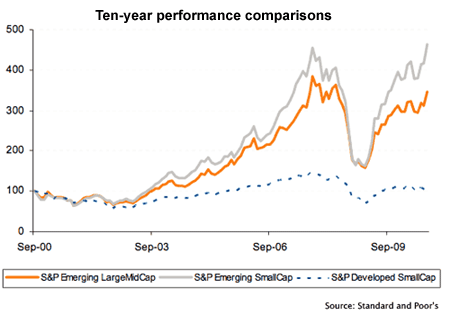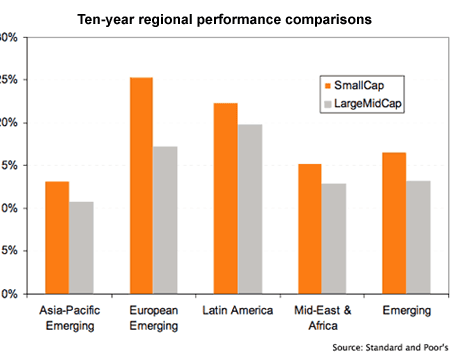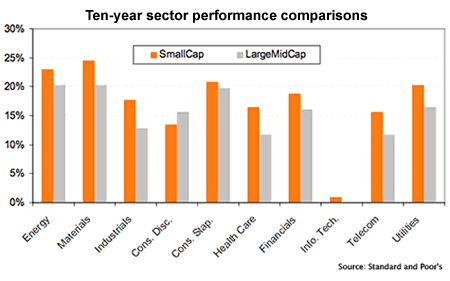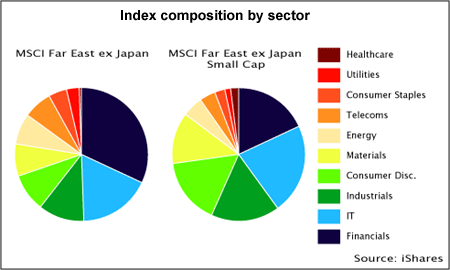Five small-cap funds for your portfolio
Emerging markets comfortably outperformed developed markets over the last ten years. And within emerging markets, small-cap companies performed better than larger ones. That's likely to continue, says Cris Sholto Heaton. Here, he explains why, and picks five small-cap funds to buy now.

Get the latest financial news, insights and expert analysis from our award-winning MoneyWeek team, to help you understand what really matters when it comes to your finances.
You are now subscribed
Your newsletter sign-up was successful
Want to add more newsletters?

Twice daily
MoneyWeek
Get the latest financial news, insights and expert analysis from our award-winning MoneyWeek team, to help you understand what really matters when it comes to your finances.

Four times a week
Look After My Bills
Sign up to our free money-saving newsletter, filled with the latest news and expert advice to help you find the best tips and deals for managing your bills. Start saving today!
It's that time when everyone trots out their predictions for the New Year. So let me go against the grain.
I don't know what will happen.
If pushed, I think markets such as Indonesia and the Philippines have run up too much and will trail better value ones such as Taiwan, Singapore and Hong Kong. And Vietnam is still very cheap if policymakers get a grip, as I think they will once the Communist Party congress is over.
MoneyWeek
Subscribe to MoneyWeek today and get your first six magazine issues absolutely FREE

Sign up to Money Morning
Don't miss the latest investment and personal finances news, market analysis, plus money-saving tips with our free twice-daily newsletter
Don't miss the latest investment and personal finances news, market analysis, plus money-saving tips with our free twice-daily newsletter
But I have no conviction in anyone's ability to forecast relative performance in the short term, least of all my own. I'm much more concerned about the long run.
There, I will happily predict that despite ups and downs, emerging markets stocks will do better than the West overall. And perhaps slightly more helpfully, if you're thinking about asset allocation, I think smaller stocks will handily outperform larger ones.
Here's why
Small has beaten large across the board
Emerging markets (EM) have comfortably outperformed their developed peers in the last decade. But anyone who had invested in smaller EM companies rather than the large ones that make up most EM indices and funds would have done even better.
According to data from Standard and Poor's, the emerging small cap index saw compound annual growth of 16.6% over the decade to September 2010. That beat emerging large and mid cap stocks (on 13.2%). It was also way ahead of developed world smaller stocks (see chart below).

That's even accounting for the global financial crisis that hit EM stocks harder than developed ones and smaller stocks worst of all (many solid companies were on low single-digit price to earnings (p/e) ratios at the worst of the crunch). Based on S&P's numbers, you would be back in the black even if you'd invested right at the peak of the market in 2007.
And this outperformance isn't just confined to one region or sector. As the charts below show, it's common across all EMs and sectors. The yellow bars (smaller stocks) almost always show higher returns than the grey ones (large and mid caps).


Why small stocks are less popular
So why have EM small caps done better? Firstly, this isn't specific to EMs. Historically in the developed world, smaller companies have outperformed larger ones. They fall more when times are bad, but rise more when times are good. Over a long enough period, the good has outweighed the bad.
The question of why small caps produce better long-term returns is an awkward one for many market theorists. Those who hold most strongly that the market is highly efficient maintain that this is related to the greater risks that small caps carry. According to modern financial theory, investors taking more risk are supposed to be offered greater potential rewards as an incentive to do so.
Now, there's no doubt that smaller stocks overall are more risky than larger ones although you can't lump them all into the same bracket. A small but established, profitable company in a defensive line of business is certainly less risky than a similarly-sized speculative oil explorer or a tech start-up.
But in any case, it's not just about the risk/reward trade-off. Instead, I think the gap between the two has a lot to do with market inefficiency. Smaller stocks tend to be much less widely researched than larger ones.
This is true in the developed world and even more so in EMs. According to US-based small-cap specialist Wasatch Capital Management, 18% of stocks in the MSCI Emerging Markets Small Cap Index have no analyst coverage at all. A further 36% have no more than two analysts watching them (based on Bloomberg data).
At the other end of the scale, a major developed market stock such as BP might show 40 brokers analysing it. Exactly what the 40th is supposed to discover that the other 39 haven't, I don't know.
Why the disparity? Because brokers cover stocks to sell shares and generate commissions, not out of the goodness of their hearts. And it's hard to sell small caps to large institutional investors. These stocks are often too illiquid or small for a fund to take a position in. Many fund management groups operate 'approved lists' dictating what stocks a manager can or cannot consider for purchase.
So many smaller stocks can't be purchased by funds, however compelling the story is. As a result, brokers don't cover them and they remain low profile. You might almost say that they are blacklisted by the investment industry.
Essentially that means there's a whole corner of the market that you're unlikely to hear about, no matter how profitable it could turn out to be.
But that's good news for private investors for whom these stocks don't have to be off limits. Because the big investors aren't interested, valuations are often low and they get a chance to buy them more cheaply. In some Asian markets, I come across many decent growth prospects with p/es of 8-10 and already paying a dividend yield of 3-4%.
If the company grows, its profile rises, market cap grows and becomes more liquid, institutions start to move in and valuations rise. So patient investors can get the benefit of strong earnings growth and a re-rating on to a higher p/e. In other words, you get two trends in your favour for the low price of one.
Emerging small caps are just beginning to take off
I think this will be a very promising market for investors in the years ahead, because EM small-cap investment is still only just taking off. The data I showed you earlier relates to the last ten years. If you go back further, to when the idea of investing in emerging markets was still very new, large caps outperformed smaller ones. Those were what all international investors went into and it was their money that moved markets.
Today, local investors are becoming more significant in many markets, while international investors have got familiar with large caps and have begun moving into small caps to some extent. And for good reason.
As well as the lower valuations, small caps should also be capable of stronger growth it's much easier for a small firm to double in size than a large one. And EM small caps often have a very different composition to larger ones. The main benchmark indices tend to be heavy on banks, energy, real estate or telecoms, which are often state-owned. Small caps instead offer more consumer themes and innovative private firms that make much more appealing investments.
The chart below comparing the MSCI Far East ex Japan and its small cap version is a good example of this.

So small caps can give you cheaper stocks, better themes and are often better run. Many EM firms are family or founder businesses. You need to be careful with controlling shareholders like these. But if the firm is well-run, the fact that the management has meaningful wealth tied up in the stock should encourage them to make sensible prudent decisions that benefit all shareholders. That's not necessarily the case for professional managers with a sack full of stock options or bureaucrats running a firm who put the national interest first.
As more money goes into these stocks, brokers should increase coverage to meet demand. As a result, many of these hidden gems will see their profile grow. Indeed, this is already happening. Broker coverage is still light, but it's definitely stronger than a few years ago. More information and more liquidity should attract more money, which should see EM small caps continue to be one of the best performers around.
So how can you invest in this trend? For those of you who like exchange-traded funds (ETFs), an obvious choice is the above-mentioned iShares MSCI Far East ex-Japan Small Cap ETF (LN: ISFE). Or you could try the wider MSCI Emerging Markets Small Cap (LN: SEMS). It also has a US-listed MSCI Latin America Small Cap tracker (US: LATM).
Two investment trusts stand out for me. Aberdeen has the Asian Smaller Companies fund (LN: AAS), run by Hugo Young and his team, whose strategy and approach always strikes me as very solid. This provider is always worth looking at for steady savers, because it offers an Isa wrapper allowing you to invest as little as £100 per month into its trusts with no purchase commission this is unique among UK investment trust providers as far as I know.
Alternatively, the Scottish Oriental Smaller Companies trust (LN: SST) has a very good track record. While I haven't met the manager, Susie Rippingall, I'm impressed by what I've seen of her work.
This article is from MoneyWeek Asia, a FREE weekly email of investment ideas and news every Monday from MoneyWeek magazine, covering the world's fastest-developing and most exciting region. Sign up to MoneyWeek Asia here
Get the latest financial news, insights and expert analysis from our award-winning MoneyWeek team, to help you understand what really matters when it comes to your finances.

Cris Sholt Heaton is the contributing editor for MoneyWeek.
He is an investment analyst and writer who has been contributing to MoneyWeek since 2006 and was managing editor of the magazine between 2016 and 2018. He is experienced in covering international investing, believing many investors still focus too much on their home markets and that it pays to take advantage of all the opportunities the world offers.
He often writes about Asian equities, international income and global asset allocation.
-
 Can US small caps survive the software selloff?
Can US small caps survive the software selloff?US stocks have made their worst start to a year since 1995 relative to a global benchmark. But experts think some sectors of the market are still worth buying.
-
 Review: Eliamos Villas Hotel & Spa – revel in the quiet madness of Kefalonia
Review: Eliamos Villas Hotel & Spa – revel in the quiet madness of KefaloniaTravel Eliamos Villas Hotel & Spa on the Greek island of Kefalonia is a restful sanctuary for the mind, body and soul